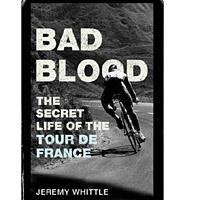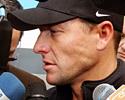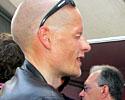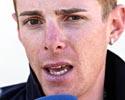
Recently on Cyclingnews.com |
Book review: "Bad Blood" by Jeremy Whittle, July 26, 2008
'The secret life of the Tour de France' - a story told by a press room insider
Former British procycling magazine editor Jeremy Whittle's new book bears a catchy title. "Bad blood" - in these unfortunate times, we immediately think of the curse that modern cycling has put on itself: doping. And we're right. Performance-enhancing drugs and methods are at the heart of the 233 page-thick story. But it's more than that. "Bad blood" - the title also needs to be understood in its figurative meaning: As Hedwig Kröner finds out, this book is really about lost friendships, hidden agendas and the greed and secrecy of a sport that is also a tough business.

|
Jeremy Whittle has witnessed this evolution for more than a decade. As a close observer for procycling magazine, he has met many of cycling's main protagonists and followed their careers for years. Some, he even got to be friends with - until the spectre of doping became too real for him to ignore. Until he had to choose sides - and chose to be truthful to the sport and the values that had made up the fascination that got him into cycling in the first place.
This very personal tale describes how Whittle, from being an unconditional pro cycling lover, became a slightly embittered behind-the-scenes connaisseur of the sport, who had made himself some enemies along the way. Lance Armstrong, for example. Whittle was one of the first journalists to build up a relationship with the later seven-times Tour de France winner in the early nineties.
He interviewed Armstrong at his home in Texas during his cancer treatment, shortly after the American had undergone surgery. He followed Armstrong's come-back and shot a film about him in his home in Nice, France. The two even talked private matters. Yet, after the Festina affair and Armstrong's first Tour de France victory, the "friends" grew apart, as Whittle refused to endorse without questioning.
"I wanted to keep the faith until recent years."-Jeremy Whittle believed in clean cycling for a long time. |
Staying true to his principles, the British sports writer became alienated with how Armstrong chose to manage his career. Carefully selecting journalists he would talk to - those who had become part of his 'Entourage' - Armstrong defended his relationship with Michele Ferrari, the ominous Italian 'preparatore', against the rest of the Tour de France press room, which included such anti-doping crusaders as David Walsh and Pierre Ballester, the authors of LA Confidentiel, and retired pro Paul Kimmage.

|
At some point during his repetitive journey around France, Whittle had to take a stance. He realised he could no longer be the admirative sports writer he once set out to be, but needed to face up to the realities of the corporate machine pro cycling truly was, and its inherent flaws. The heroes and idols of his adolescence made way to real, vulnerable persons - such as Greg Lemond, whose conflict with Armstrong, according to Whittle, comes from his honest desire to clean up the sport.
Whittle also draws a personal portrait of fallen but redempted star David Millar, with whom he still has close ties. He describes the psychology of doping and how its culture has invaded the sport to the root. He explains the 'omerta', an unwritten rule within the cycling circus prohibiting and condemning those who 'spit into the soup', who recognize and denounce doping. Ultimately, Whittle chose to stick to ethics - a choice that provided him with some "bad blood".

|
But contrary to its rather blunt title, the book is quite a sensitive one. Reading it stirred up some thoughts on the philosophy of doping as such and provided for some late night discussions. Is cheating or doping intrinsic to our society? Have we not all cheated or lied, at some point or another? Do the little lies we live with everyday - copying off our classroom neigbour at school, speeding on the motorway, desperately trying to reduce our tax bill... - do these not pave the way for dopers, who have learned that trying to get a light advantage over others is not such a bad thing at all?
"Sport should offer escape; it should offer sanctuary from the casual lies and banal cruelties that punctuate everyday life," Whittle writes. "Rather than embodying the ugliest elements in human nature, it should strive to encapsulate the best." Yes, in a better world, it should be so. But who are we to tell our sports role models how to live their lives if we are not being perfect examples, too? Especially the people actively involved in cycling - where does our responsibility begin?

|
This is where Whittle's story is especially insightful. It describes the mechanisms of the Tour de France press room, and how even journalists prefer to close their eyes on the obvious for fear of possibly losing the source of their income. "Riccardo Ricco's case sums it up, cheered on by journalists and TV commentators who should know better but who are so much part of the omerta that they dare not to speak out," Whittle told us.
"I wanted to keep the faith until recent years, when - like many others - the misery of doping became overpowering. I felt I couldn't take any more abuse of my intelligence. I began to feel like an accomplice, like I was defending the indefensible. Sitting in Michael Rasmussen's press conferences at last year's Tour, listening to him tie himself in knots with his lies, was so pathetic. It was the straw that broke the camel's back. It just made me mad because it was such an insult to people's intelligence."
Towards the end of the book, Whittle summed up the paradox of doping within sport in a simple, yet very intelligent way: "We love sport, not for its certainties, but for its uncertainties. But uncertainty is of no use to a doper. They want guarantees for success. (...) Paradoxically, dopers are fragile, paranoid and insecure, because they know that, on the day they don't dope, they will have non certainty. Ironically, for people who have given their lives to the pursuit of sporting excellence, those who dope themselves will never really know what their natural limits are."
Photography
For a thumbnail gallery of these images, click here
Images by Yellow Jersey Press
- In "Bad blood" Jeremy Whittle describes how he got increasingly frustarted with doping.
Images by Roberto Bettini/www.bettiniphoto.net
- Riccardo Riccò boasted with doping as early as age 15.
- Lance Armstrong carefully chose who he talked to, according to Whittle.
- Michael Rasmussen's whereabouts affair cast shadows of doubt on his honesty.
Bad Blood by by Jeremy Whittle was published at Yellow Jersey Press , ISBN-10: 0224080229.
